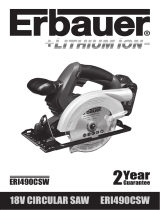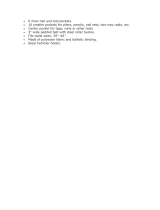
Additional Safety Rules
Battery Packs
a) Ensure the switch is in the off position
before inserting the POWERhandle (battery).
Inserting the battery pack into power tools that
have the switch on invites accidents.
b) A battery operated tool with integral
batteries or a separate battery pack must be
recharged only with the specified charger for
the battery. A charger that may be suitable for
one type of battery may create a risk of fire when
used with another battery.
c) Use battery operated tool only with
specifically designated battery pack. Use of
any other batteries may create a risk of fire.
d) The battery pack for this tool has been
shipped in a low charge condition. You should
charge the battery pack fully before use.
e) Avoid conducting short charges. Make sure
that the battery is fully charged every time by
allowing the charger to complete its full charging
cycle.
f) Never allow the drill to come to a complete
standstill before recharging. The battery should
be placed on charge whenever it is noticeably
running down or the drill no longer performs a
task it previously performed.
g) To ensure the longest battery life and best
battery performance, always charge the battery
when the air temperature is between 18-24°C
(65-75°F). Do not charge or store the battery
pack below 4°C (40°F), or above 40°C (104°F).
This is important. Failure to observe this safety
rule could cause serious damage to the battery
pack.
h) Do not incinerate the battery pack even if it is
seriously damaged or can no longer hold a
charge. The battery pack can explode in a fire.
i) A small leakage of liquid from the battery
pack may occur under extreme usage or
temperature conditions. This does not
necessarily indicate a failure of the battery pack.
However, if the outer seal is broken and this
leakage comes into contact with your skin:
?Wash the affected area quickly with soap and
water
?Neutralise the liquid with a mild acid such as
lemon juice or vinegar
If the leakage gets into your eyes:
?Flush your eyes with clean water for a
minimum of 10 minutes and seek immediate
medical attention. Inform the medical staff
that the liquid is a 25-35% solution of
potassium hydroxide.5. Never attempt to
open the battery pack for any reason. If the
plastic housing of the battery pack breaks
open or cracks, immediately discontinue its
use and do not recharge it.
j) Do not store or carry a spare battery pack in
a pocket or toolbox or any other place where it
may come into contact with metal objects. The
battery pack may be short circuited causing
damage to the battery pack, burns or a fire.
I) If the battery of the POWERhandle (battery
pack) utilises nickel-cadmium cells, beware that
cadmium is considered to be a toxic material.
k) Use an environmentally safe disposal unit at
a municipal waste disposal centre to dispose of
a damaged or worn out battery, or return it to
your dealer.
POWERhandle - Additional Safety Rules
3.2
1. To fit the POWERhandle to a product, grip
one in each hand and align the rails. Push the
POWERhandle forward onto the product until it
‘clicks’ and will move no further. To ensure that it
is fully assembled, try to pull them apart; they
should be locked together.
2. To release a POWERhandle from a product,
first pull the release slider down with your thumb
whilst gripping the handle. Grip the product head
with the other hand and pull the POWERhandle
backwards. The handle should easily slide off
the product.
All POWER8 components are connected and
disconnected in this way; it is also necessary to
slide the product release slider down to remove
the POWERhandle from the charger dock.
POWERhandle - Operating Instructions
3.3
1
2
2
1
2






















